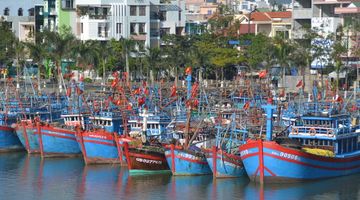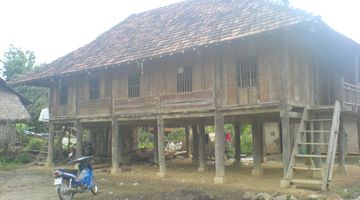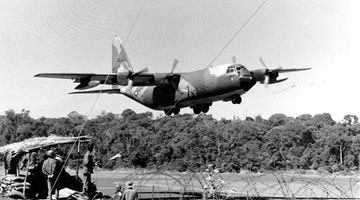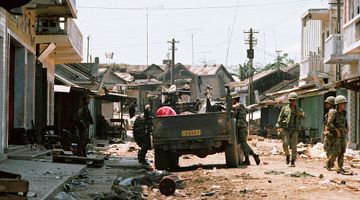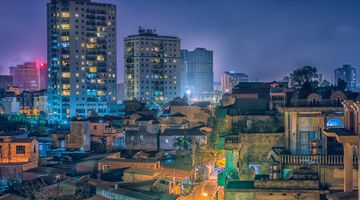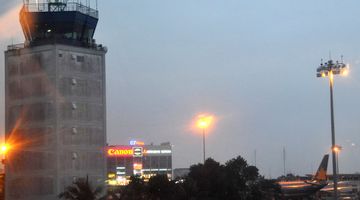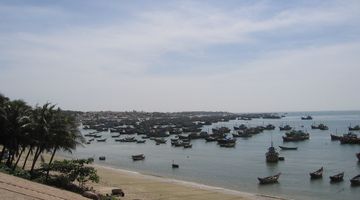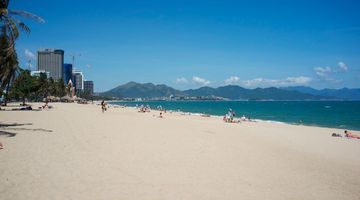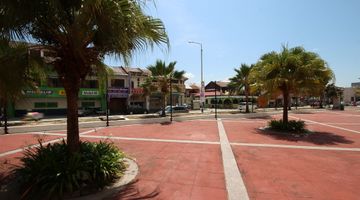Danang
In a nutshell
The coastal city of Da Nang falls on the map about halfway between Vietnam’s hotspots of Ho Chi Minh City and Hanoi. While the city itself is the third largest in the entire country, one of the main reasons visitors are attracted to Da Nang is due to its proximity to other well known cities; the Imperial city of Hue or the wanderer’s paradise of Hoi An are just a stone’s throw away.
Why go to Da Nang
With a new found friendliness to tourists, Da Nang continuously attracts more and more international visitors as the years go on. While Vietnam isn’t as well known for its beaches like other Southeast Asian countries, the sand and surf in Da Nang does offer some great opportunity for fun in the sun.
You won’t find a typical Vietnamese city in Da Nang; it’s quickly being built up with luxury resorts and prime real estate as more and more beach-loving tourists continue to flock in. While we found the city lacking in a certain cultural feel often found elsewhere, it does act as the perfect launching point for exploring the rest of Central Vietnam.
When to go to Da Nang
Da Nang’s weather doesn’t see too much variation, which places it high on our list of ideal climate spots. We were happy not to find scorching temperatures here, even in the middle of summer. From May to September, it doesn’t get much hotter than 24 degrees Celsius, and in other months throughout the year, the low sits around 20 degrees.
For the best time to visit Da Nang, plan your trip sometime between February and May; you’ll miss the heavy rainfall season and beat the high tourist traffic months of June through August.
Since this city’s weather stays pretty constant year round, you won’t need any heavy clothing. Come ready to spend time on the beach, but do bring a light jacket for evenings when the coastal winds blow in.
Accommodation in Da Nang
Like other big cities in Vietnam, Da Nang offers a wide variety of accommodation options. From budget hostels, to mid-range flashpacker hotels and guesthouses, to luxury beach resorts, this growing city has it all.
One of the easiest locations to find a place to stay is along China Beach, an area well known for its American-Vietnam war history. While this was once a battle-torn area, it’s quickly becoming packed with boutique hotels along with a host of other accommodation options.
The value for money won’t take you quite as far in Da Nang as it would in other large cities throughout the country, but simple, budget options do abound. Since this coastal city is in the process of being built up by resorts and continues to see an increasing amount of tourists as the years go by, hotels are also bumping up their prices.
Food in Da Nang
Da Nang is a hugely international city when it comes to cuisine. To start, you’ll find dishes from all over Vietnam due to its central location in the country. With the resort style atmosphere, fine dining has also made itself known; high end, quality Vietnamese and international food can be found throughout the city. Of course, with its coastal location, seafood also plays a huge part in local cuisine. Entire meals can be had from around VND10,000 and upwards.
We suggest spending an evening enjoying traditional Vietnamese BBQ in Da Nang. You’ll be set up with your own, personal tableside grill to cook fresh seafood and meats on. For the more adventurous eaters, you can find foods like frog or squid on BBQ menus. Otherwise, expect ingredients like pork or shrimp. Vietnamese BBQ in Da Nang typically costs around VND30,000-VND60,000.
Getting around in Da Nang
Da Nang is a pretty large city, so unless you’re just planning to spend a day on the beach or exploring the immediate surrounding area, you’ll need to make use of local taxis or perhaps rent your own motorbike.
If you do opt to drive your own vehicle, know that you’re legally required to have a Vietnamese driver’s license. While this fact tends to go ignored, if you get into an accident, you can be faced with some tricky legal issues.
To keep it simple, we suggest using taxis to get around. You likely won’t pay much more than VND15,000 within the city, and all legitimate drivers use meters. You’ll also find phone numbers of taxi companies on the sides of cars. You’ll almost always be able to speak to someone in English to schedule a pick-up.
Getting in and out
Da Nang is located right between some of Vietnam’s most popular cities and is well connected by a number of transportation modes.
To start, Da Nang is located in close proximity to its international airport, DAD. While it’s a fairly small hub, domestic and international flights bring travellers in daily. The trip from DAD to the city centre won’t take you much longer than 10 minutes by taxi, so the convenience factor is top notch.
From within Vietnam, you can travel by bus or train if opting for public transportation. The Reunification Express train stops in the city to and from places like Hue, Nha Trang, Ho Chi Minh City, and Hanoi.
Note that the higher numbered trains normally stop at many small stations. That being said, travelling by train is fairly affordable. To get from Da Nang to Hue, for example, you’ll spend about four and a half hours on trains and pay around VND140,000.
Buses are a popular option, too, since the entirety of Vietnam is so well served by them. From Hoi An, you’ll only spend about an hour and a half on the bus with a VND120,000-140,000 fare.
You can also catch a bus from further away cities like Hanoi and Ho Chi Minh. From Hanoi, you’ll pay around VND500,000 for a 15 hour ride; prices and duration are similar for HCM.
Da Nang’s most well-served bus station sits about 5-10 minutes outside of the city centre. From there, you’ll be able to access almost all major cities throughout the country including Dong Hoi, Quy Nhon, Hue, Kon Tum, and Hoi An. Of course, for added convenience and to ensure a timely departure you should book online ahead of time.
If you don’t have time to take a full-day bus ride, your best option is to travel by plane. Vietnam Airlines has frequent, daily flights starting at around USD60 to either end of the country. For the quickest way to get around, this is a good go-to option.
Is Da Nang safe?
Like other Vietnamese cities, Da Nang is rife with petty scams. Do your best to blend in with the locals; be on the lookout for ripoffs, whether you’re buying a bus ticket or grabbing a bite to eat. Make sure to always use metered taxis, as unassociated drivers will likely try to charge you a rate well-above what was agreed on if you don’t.
